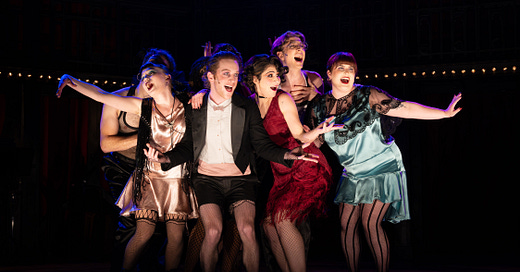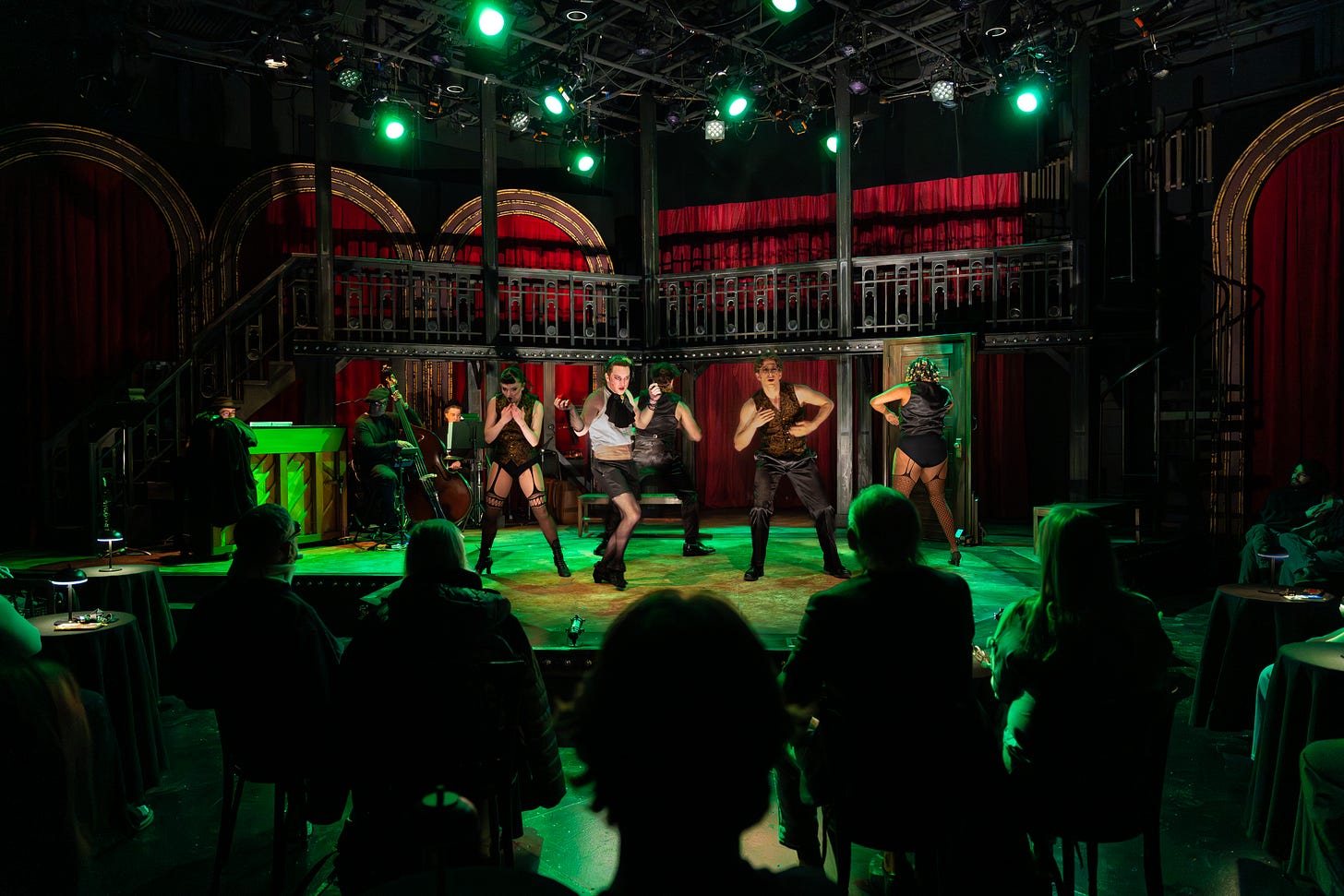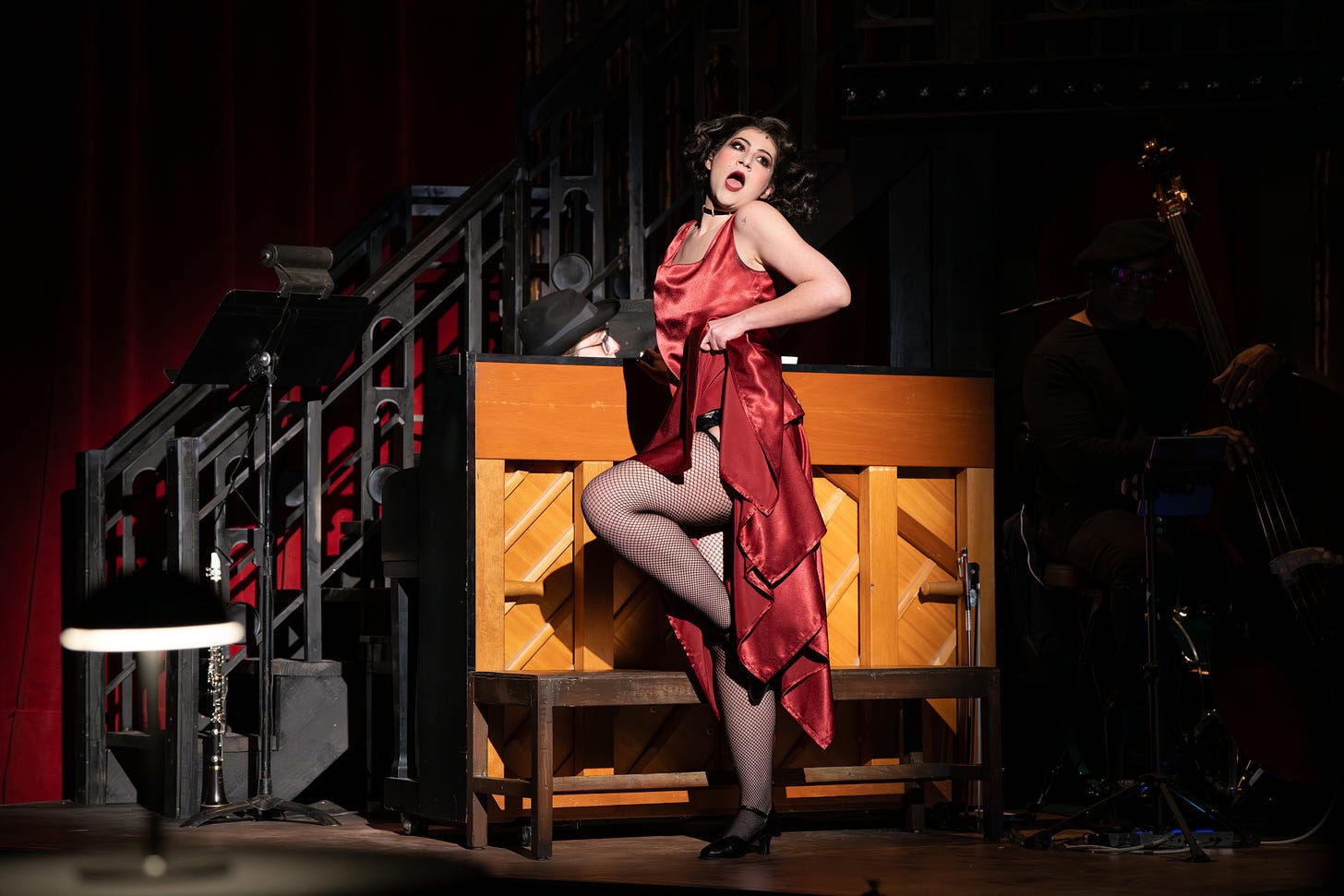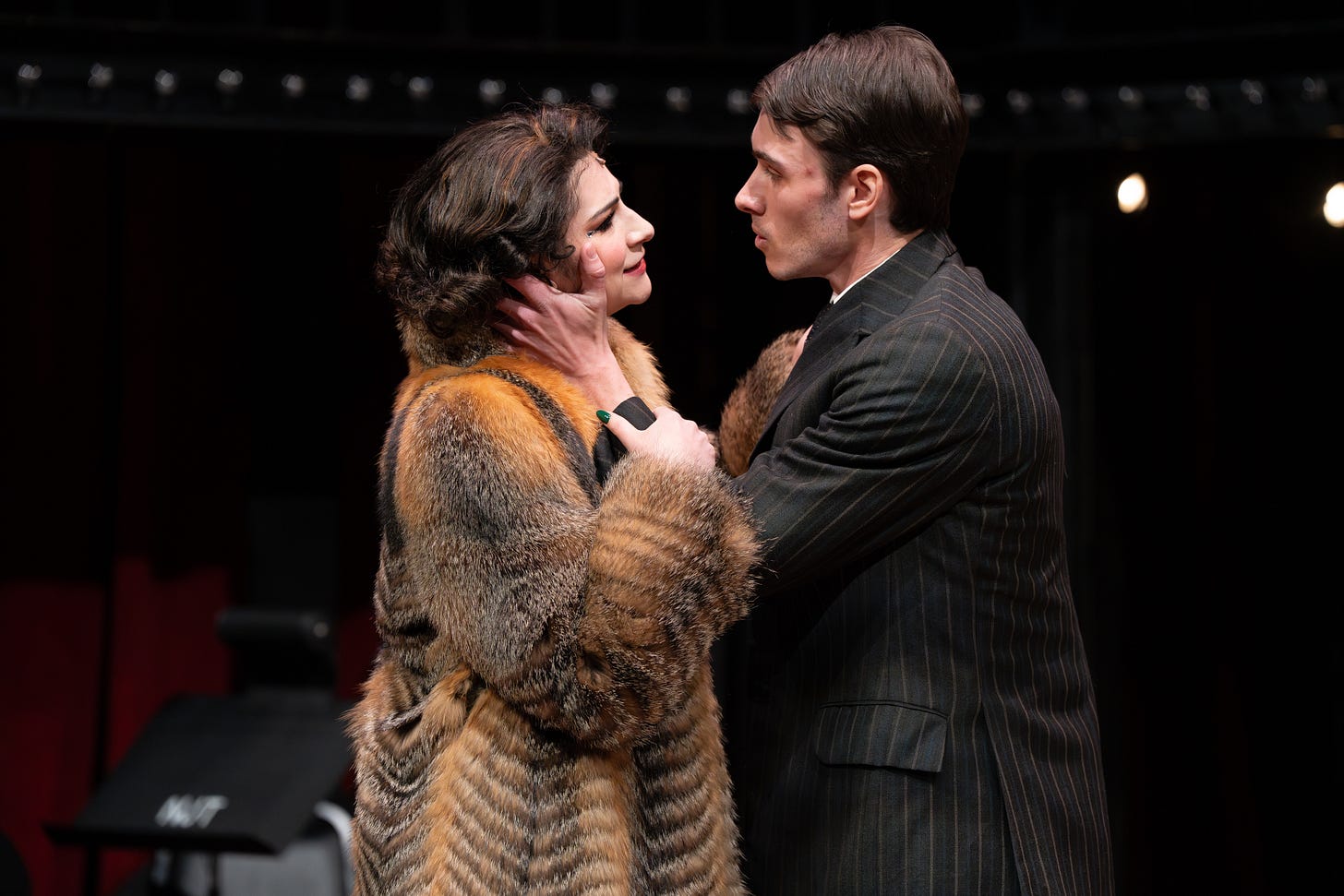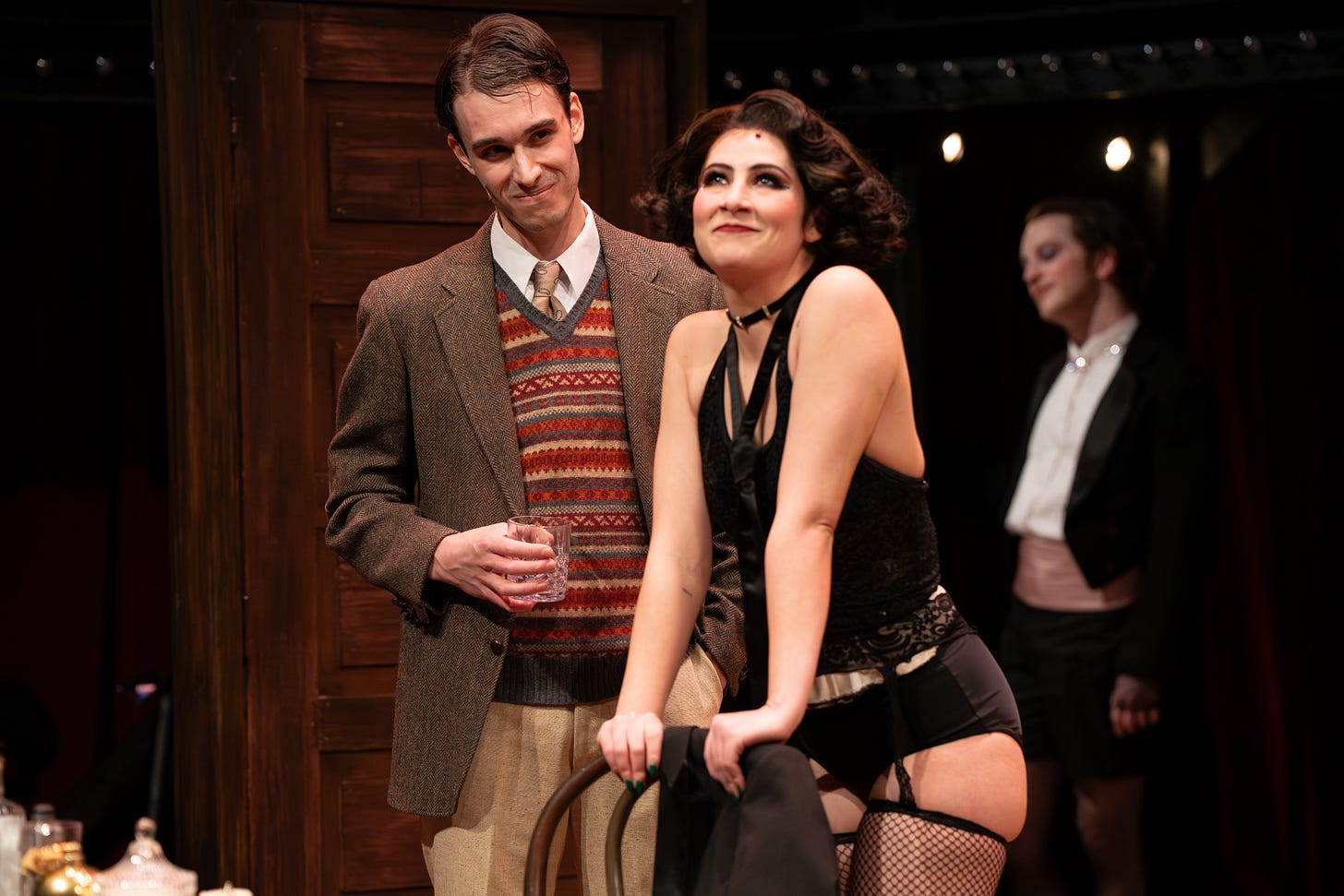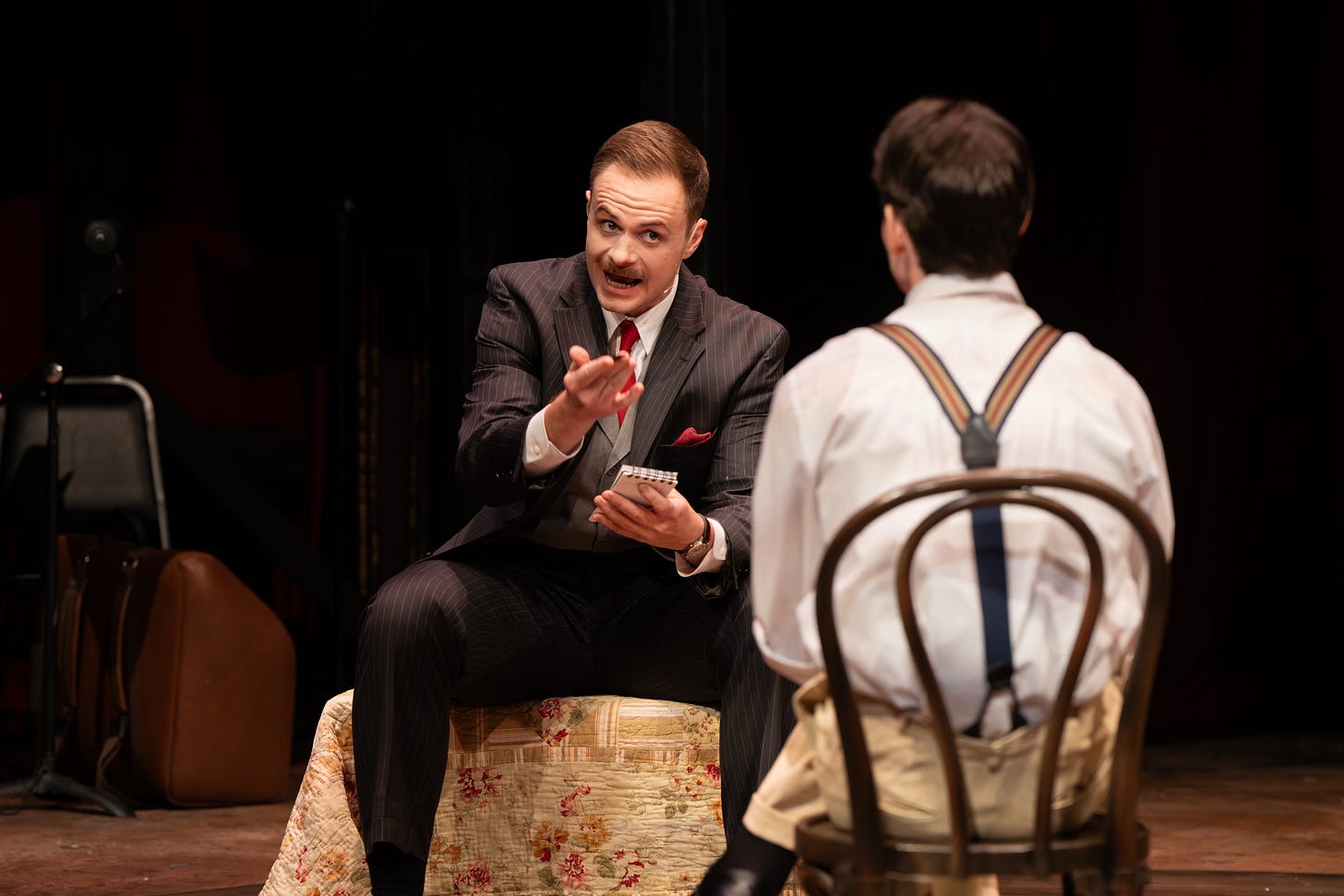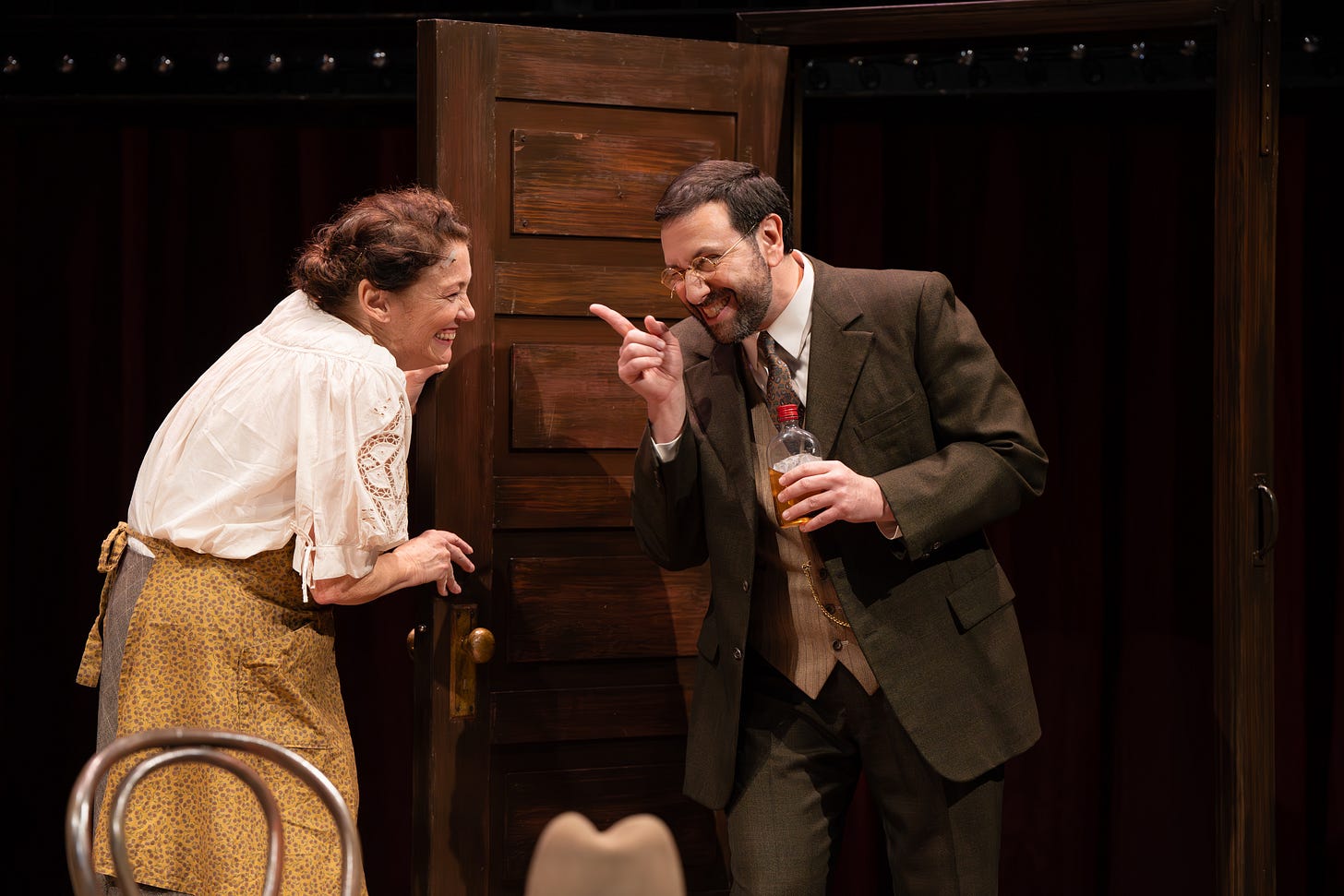Through April 13: A Haunting, Immersive 'Cabaret' Shines at New Jewish Theatre
An unflinching, immersive production that lingers long after the final note.
The defining moment, the one that exemplifies how this production of “Cabaret” is distinguished from those that came before it, is embodied in Hailey Medrano’s performance as Sally Bowles of this musical’s eponymous song at the end of the second act. Director Rebekah Scallet slows down that number to balance this production’s ironic approach (“Start celebrating right this way / Your table's waiting”) with the doomed diversions of the Kit Kat Klub’s patrons and performers (“Start by admitting from cradle to tomb / Isn't that long a stay”).
It’s a reminiscent of Judy Garland’s slow and heartbreaking version of “Somewhere Over the Rainbow” during her 1961 concert at Carnegie Hall. Medrano and Garland deliver their songs a profound sense of melancholy and longing, as well as their personal struggles and vulnerabilities. Medrano, sometimes shaking with despair and sometimes quivering with defeated anger, delivers a hauntingly compelling (and very un-Liza-like) version of “Cabaret” that lingers long after the performance. It’s so intense her voice breaks – and so do our hearts.
The show’s final scene (no spoilers) takes that song and pushes the show’s prophetic message beyond the musical’s run time. NJT’s production of “Cabaret” modestly reinvents this classic musical with an immersive, intimate staging that transports the audience directly into the gritty, seductive world of 1929 Berlin. The theater’s unique setup in the Wool Studio Theatre surrounds the stage with a mix of traditional seats and cabaret tables, giving viewers a sense of stepping into the Kit Kat Klub itself.
In this pared-down production, a nimble cast of 11 takes on multiple roles, heightening the immediacy and urgency of the story. The intimate scale underscores the chilling parallels between the musical’s setting and today’s resurgence of anti-Semitism, reminding us that behind the dazzling performances and smoky allure of the cabaret lies the ominous specter of Nazi power on the rise.
Scallet’s thoughtful approach never lets us forget that the seductive world onstage is precariously balanced on the edge of catastrophe. NJT’s version is closely related to Sam Mendes' “Cabaret” revival in London and its subsequent Broadway transfer. Scallett brings Mendes’ immersive, cabaret-style staging and maintains the show’s intimate, darker vision, but with far less crotch grabbing by the Emcee.
Another influence that contributes to the approach, vibe and experience of NJT’s production is the collaboration with the St. Louis Kaplan Feldman Holocaust Museum, which provided historical research and context on the rise of Nazi Germany and the societal complacency that allowed it to unfold. This partnership deepened the production’s exploration of the musical’s dark themes, ensuring a relevant and historically informed portrayal of the era’s political tensions alongside the seductive allure of the Kit Kat Klub. I’ve always preferred the presentation of the Nazi menace in “Cabaret” over that in “The Sound of Music,” and that preference is reinforced by the Museum’s subtle-yet-powerful influence in this production.
Stepping into the Wool Studio Theatre, the set design by David Blake evokes a makeshift, repurposed space—once an industrial building, now transformed into a decadent nightclub—where remnants of the past, like rusted radiators and worn columns, subtly hint at a grittier history beneath the glitz of the Kit Kat Klub. Audience members who chose to sit at one of the small tables around the stage provided them with front row seating where they could feel an even closer connection to the show and its performers.
Based on the publicity photos of Spencer Davis Milford, I was expecting an eye-lined Emcee in the vein of Alex DeLarge, the character known for his menacing lashes in “A Clockwork Orange.” What Milford delivers (with more subtle eyeliner) is a charismatic, unsettling figure who is this part creepy come-hither and part campy come-get-it. He deftly blurs the line between charm and menace, embodying a sense of moral and sexual ambiguity – and evokes something from the song by REM: “I am smitten / I'm the real thing (I'm the real thing) / We all invent ourselves.”
Milford’s performance of the Emcee’s signature songs is satisfying and engaging. Rather than compare his “Wilkommen” with all this forbears, there’s a moment in the second act that is more significant. It occurs during “I Don’t Care Much,” and Milford, with an air of resignation mirroring that of Sally’s, slowly removes his lacy opera gloves and lays them on the piano. He cannot maintain the magic of Klub; the illusion is no longer as welcoming or seductive. Reality is about to set in. All of this captured in Milford’s simple action.
Milford delivers a fine, affecting moment, enhanced by the gloves and lacy leggings, well chosen by costume designer Michele Friedman Siler. Siler’s costumes for all the characters play a crucial role in enhancing the immersive atmosphere of the Kit Kat Klub, blending period-appropriate (and sometimes tatty) 1920s attire with a provocative, almost surreal edge. Siler’s designs feature glamorous-yet-gritty looks that underscore the stark contrast between the seductive allure of the Klub and the ominous, imminent political unrest.
Contributing to the vibe and experience of this “Cabaret” is the lighting design by Denisse Chavez. Of course there’s plenty of expected uplighting to give the cast an appropriate amount of creepy surrealism. Yet Chavez’s design includes some unexpected – and unexpectedly effective – moments that remind the audience that the Kit Kat Klub isn’t as glitzy as it pretends to me. In these moments, characters step out of the spotlight and into the surrounding darkness for a significantly long time.
The first time this happens, we wonder if the spotlight operator forgot to follow. When it happens again, this choice calls attention to itself. The use of light and dark metaphorically emphasizes the musical’s overarching transition from the indulgent, artificially bright atmosphere of Berlin’s libertines to the darkening violence. It’s also something that could have happened in the time period; the Klub is not a polished, professional theater. This is a bold lighting choice that works in this production, though it does give one pause at first.
In addition to her aforementioned performance of the song “Cabaret,” Medrano’s Sally Bowles is marked by a raw vulnerability beneath a showgirl bravado. Her portrayal captures the character's fleeting optimism and her tragic obliviousness to the impending darkness of Nazi Germany.
Dustin Petrillo’s performance as Clifford Bradshaw is characterized by a quiet-yet-poignant transformation from an idealistic writer to a man disillusioned by the seductive-yet-dangerous world around him. His nuanced portrayal captures the character's internal struggle as he grapples with his own desires and the looming threat of the political chaos engulfing Berlin.
Aaron Fischer’s daunting task is to deliver a chillingly subtle Ernst Ludwig – a task he accomplishes well as his character moves from a charming, affable figure to a harbinger of darkness. Kudos, too, to Jane Paradise as Fraulein Schneider. Her performance is heartfelt and poignant, and captures her character's mix of resilience and vulnerability as she navigates the harsh realities of pre-Nazi Germany. Her rendition of "So What?" and "What Would You Do?" underscores Fraulein Schneider’s internal conflict between self-preservation and moral compromise. Paradise delivers a deeply human perspective on the moral complexities faced by ordinary people during times of rising political terror.
Dave Cooperstein’s performance of Herr Schultz is appropriately endearing and tragic. He embodies the character’s warmth and idealism in the face of growing political unrest. His rendition of "Married" is tender and sincere, and reveals his deep affection for Fraulein Schneider while also subtly hinting at the impending heartbreak and devastation of a world that refuses to tolerate their love.
Carter Haney is the musical director whose work includes the small onstage band, including Brad Martin on drums, Alerica Anderson on bass and Kris Pineda on accordion and trombone. The band plays an integral part of the seedy, immersive atmosphere of the Kit Kat Klub. Their lively, brassy performance adds to the Klub’s chaotic allure while underscoring the show's haunting juxtaposition of hedonism and impending doom.
This being awards season, a trophy for Best Performance In a Gorilla Costume should go to Lillian Cooper (she also plays Texas) for her work in “If You Could See Her,” a song that initially appears lighthearted and absurd, then takes a dark, gut-punch turn at the end when the Emcee delivers the final line: "If you could see her through my eyes... she wouldn’t look Jewish at all." Another trophy should go to Paradise and Cooperstein for Best Performance With An Ananas Comosus. Their rendition of "It Couldn't Please Me More" is a charming and tender duet between Herr Schultz and Fraulein Schneider. The song is risky because it’s so ridiculous, yet Paradise and Cooperstein make real the romantic gesture and significance of the fruit.
New Jewish Theatre’s “Cabaret” runs through April 13 at the Wool Studio Theatre, located within the Jewish Community Center's Staenberg Family Complex in St. Louis. See the website for more information.

